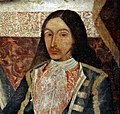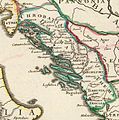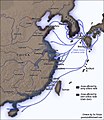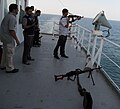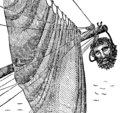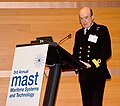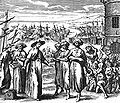Introduction

Piracy is an act of robbery or criminal violence by ship or boat-borne attackers upon another ship or a coastal area, typically with the goal of stealing cargo and other valuable goods. Those who conduct acts of piracy are called pirates, and vessels used for piracy are called pirate ships. The earliest documented instances of piracy were in the 14th century BC, when the Sea Peoples, a group of ocean raiders, attacked the ships of the Aegean and Mediterranean civilisations. Narrow channels which funnel shipping into predictable routes have long created opportunities for piracy, as well as for privateering and commerce raiding.
Historic examples of such areas include the waters of Gibraltar, the Strait of Malacca, Madagascar, the Gulf of Aden, and the English Channel, whose geographic structures facilitated pirate attacks. The term piracy generally refers to maritime piracy, although the term has been generalized to refer to acts committed on land, in the air, on computer networks, and (in science fiction) outer space. Piracy usually excludes crimes committed by the perpetrator on their own vessel (e.g. theft), as well as privateering, which implies authorization by a state government.
Piracy or pirating is the name of a specific crime under customary international law and also the name of a number of crimes under the municipal law of a number of states. In the 21st century, seaborne piracy against transport vessels remains a significant issue, with estimated worldwide losses of US$25 billion in 2023, increased from US$16 billion in 2004. (Full article...)
Selected biography -

Bartholomew Roberts (17 May 1682 – 10 February 1722), born John Roberts, was a Welsh pirate who was, measured by vessels captured, the most successful pirate of the Golden Age of Piracy. During his piratical career, he took over 400 prize ships, although most were mere fishing boats. Roberts raided ships off the Americas and the West African coast between 1719 and 1722; he is also noted for creating his own pirate code, and adopting an early variant of the Skull and Crossbones flag.
Roberts's infamy and success saw him become known as The Great Pyrate and eventually as Black Bart (Welsh: Barti Ddu), and made him a popular subject for writers of both fiction and non-fiction. To this day, Roberts continues to feature in popular culture, and has inspired fictional characters (such as the Dread Pirate Roberts). (Full article...)
Selected article -
The Golden Age of Piracy is a common designation for the period between the 1650s and the 1730s, when maritime piracy was a significant factor in the histories of the North Atlantic and Indian Oceans.
Histories of piracy often subdivide the Golden Age of Piracy into three periods: (Full article...)
Did you know?
- ... that Saudi Arabian broadcaster beoutQ pirated and resold beIN Sports programmes during the Qatar diplomatic crisis?
- ... that the developers of Hotline Miami 2: Wrong Number suggested that Australian customers pirate their game?
- ... that indigenous Australian artist Daniel Boyd has depicted colonial figures including Captain James Cook and Governor Arthur Phillip as pirates?
- ... that HMS Redpole, one of the aptly-named coffin brigs, sank in an action with a pirate vessel in August 1828?
- ... that Black Sheep Radio dedicated its first day of programming to a fallen pirate?
- ... that since 1904 the Gasparilla Pirate Festival in Tampa, Florida, has featured a pirate-themed parade?
- ... that there is only one account of walking the plank?
- ... that in the Golden Age of Piracy, the word "pirate" was often spelled "pyrate" or "pyrat"?
- ... that English pirate Henry Every, who was sometimes known as Long Ben, was one of the few major pirate captains to retire with his loot without being arrested or killed in battle?
Selected quotations
| “ | A merry life and a short one shall be my motto. | ” |
| — Bartholomew Roberts | ||
General images
Selected Jolly Roger

Subcategories
Topics
WikiProjects
Related portals
Things you can do

Contribute
- Work on piracy and pirate articles and help improve them to featured articles.
Expand
Join
WikiProject Piracy Requests
- eliminate red links from List of pirates
- expand Timeline of piracy, specifically to fill in vast gap between the 1890s to 2000s
- revise Bartholomew Roberts
- help with Requested articles and Expand articles
- help with Portal:Piracy
Associated Wikimedia
The following Wikimedia Foundation sister projects provide more on this subject:
-
Commons
Free media repository -
Wikibooks
Free textbooks and manuals -
Wikidata
Free knowledge base -
Wikinews
Free-content news -
Wikiquote
Collection of quotations -
Wikisource
Free-content library -
Wikiversity
Free learning tools -
Wiktionary
Dictionary and thesaurus

















